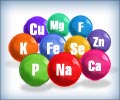As Hippocrates famously stated, "
Our food should be our medicine, and our medicine should be our food." This rings true, especially as we age, as our bodies require different nutrients to maintain optimal health and wellness.
Vitamins and minerals are essential micronutrients that play a crucial role in promoting longevity and vitality in older adults. There are 13 essential vitamins - vitamins A, C, D, E, K, and the B vitamins (thiamine, riboflavin, niacin, pantothenic acid, biotin, B6, B12, and folate) and 16 minerals (Calcium, Phosphorus, Magnesium, Sodium, Chloride, Potassium, Sulfur, Iron, Zinc, Copper, Manganese, Iodine, Selenium, Molybdenum, Chromium, Fluoride) that are involved in numerous functions in the body, such as maintaining strong bones and muscles, promoting immune system function, and reducing the risk of chronic diseases such as heart disease, cancer, and osteoporosis.
Overall, adequate intake of essential vitamins and minerals is essential for promoting longevity and vitality in older adults. While many vitamins and minerals can be obtained through a balanced diet, some older adults who are 51 plus may require supplementation to ensure they are meeting their nutrient needs. Medindia's calculator provides you with a ready reckoner to check your requirements.
Vitamins and Minerals for Healthy Aging: Insights from Medical Research on Nutrition and Longevity
Medical research has consistently demonstrated the role of certain vitamins and minerals in promoting longevity and vitality in older adults. For example, studies have shown that -
- Intake of vitamin D in the right proportion can help reduce the risk of falls and fractures, improve muscle strength and balance, and even reduce the risk of chronic diseases such as cancer and diabetes(1✔ ✔Trusted Source
Vitamin D deficiency
Go to source). - Maintaining adequate levels of calcium, magnesium, and vitamin K can help reduce the risk of osteoporosis and improve bone health(2✔ ✔Trusted Source
Calcium plus vitamin D supplementation and risk of fractures: an updated meta-analysis from the National Osteoporosis Foundation
Go to source). - Studies have shown that for maintaining cognitive function and overall vitality in older adults, adequate intake of certain B vitamins, such as folate, B12, and B6, is required ,to help reduce the risk of cognitive decline and dementia(3✔ ✔Trusted Source
Blueberry supplementation improves memory in older adults
Go to source). - Similarly, studies have demonstrated the importance of minerals such as iron and zinc in maintaining cognitive function and reducing the risk of age-related cognitive decline(4✔ ✔Trusted Source
Changes of trace element status during aging: results of the EPIC-Potsdam cohort study
Go to source).

 Email
Email






